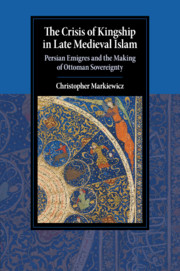Book contents
- The Crisis of Kingship in Late Medieval Islam
- Cambridge Studies in Islamic Civilization
- The Crisis of Kingship in Late Medieval Islam
- Copyright page
- Contents
- Figures
- Maps
- Acknowledgments
- Note on Usage
- Abbreviations
- Book part
- Introduction
- Part I
- Part II
- Conclusion
- Book part
- Bibliography
- Index
- Series page
Introduction
Published online by Cambridge University Press: 03 August 2019
- The Crisis of Kingship in Late Medieval Islam
- Cambridge Studies in Islamic Civilization
- The Crisis of Kingship in Late Medieval Islam
- Copyright page
- Contents
- Figures
- Maps
- Acknowledgments
- Note on Usage
- Abbreviations
- Book part
- Introduction
- Part I
- Part II
- Conclusion
- Book part
- Bibliography
- Index
- Series page
Summary
In the sixteenth century, Muslim rulers of the largest empires of West and South Asia all embraced a new vocabulary of sovereignty that supplemented traditional Perso-Islamic titles and concepts of rule. To be sure, the traditional nomenclature remained. The Ottoman sultan, the Safavid shah, and the Mughal padishah still frequently referred to themselves by titles with long histories in Islamic lands. In all cases, these titles were mutually intelligible across these empires and to a large extent interchangeable in Ottoman Istanbul, Safavid Qazvin or Isfahan, and Mughal Delhi or Fatehpur Sikri. That is to say, on the basis of a long-established and shared cultural heritage, sultan, shah, and padishah were all recognized and accepted markers of sovereignty across a wide expanse between the Balkans and Bengal.1 Yet, in addition to these traditional titles of sovereign authority, alternative claims emerged prominently in the sixteenth century within these three Muslim polities. Such claims powerfully enhanced the older designations. They also often suggested a rationale for rule on a sacral or cosmic universal scale. These emperors were not just preeminent in their own domains, but became sahib-qiran (lord of the auspicious astral conjunction), mujaddid (centennial renewer of the faith), khalifa-yi ilahi (Vicegerent of God), and occasionally mahdi-yi akhir-i zaman (Harbinger of the End Time).
- Type
- Chapter
- Information
- The Crisis of Kingship in Late Medieval IslamPersian Emigres and the Making of Ottoman Sovereignty, pp. 1 - 22Publisher: Cambridge University PressPrint publication year: 2019

